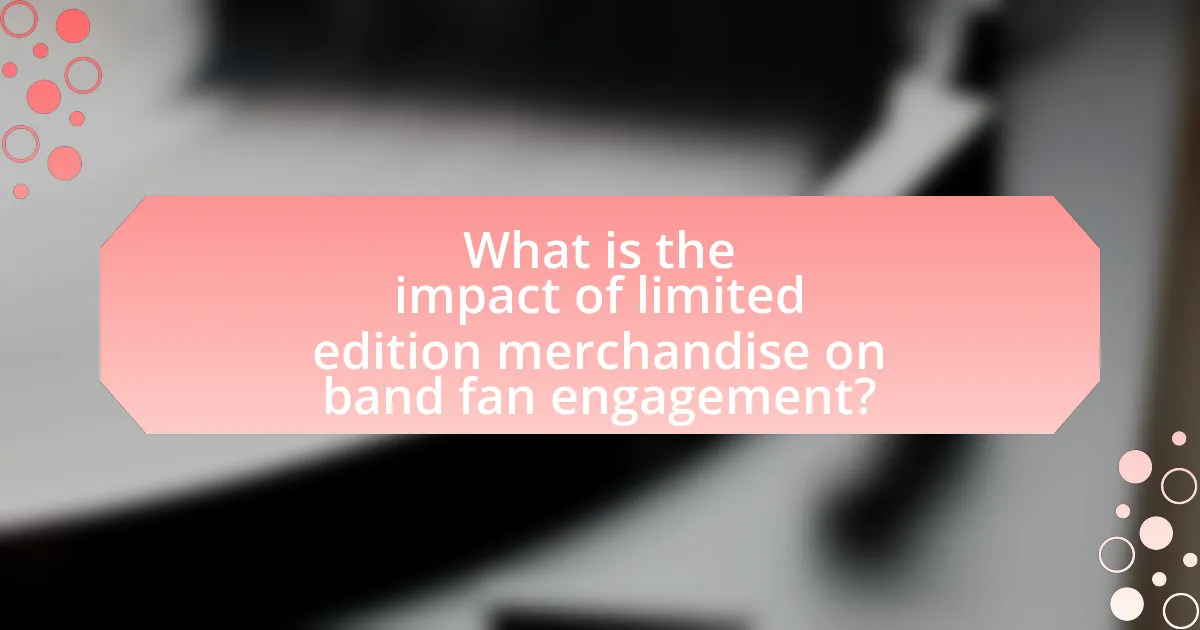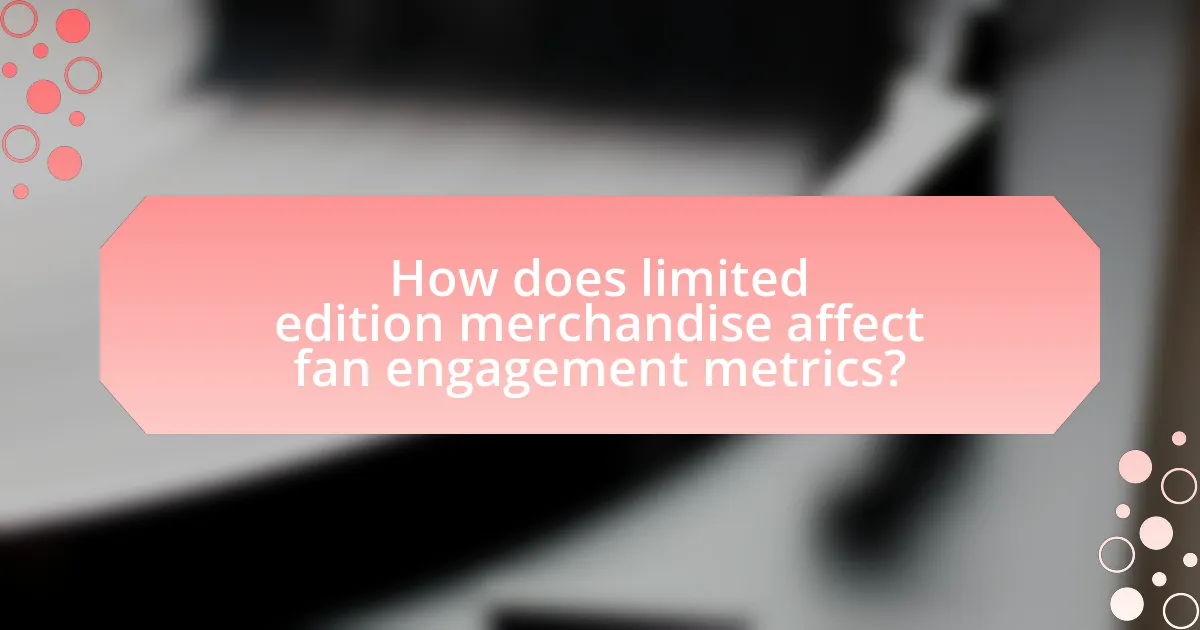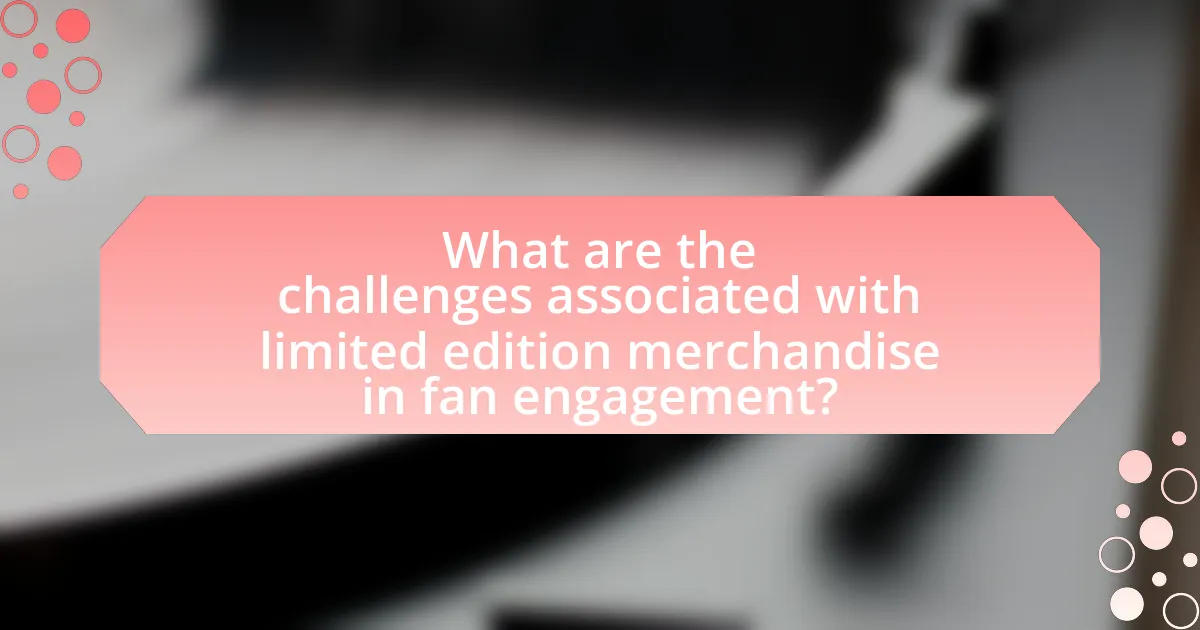The article examines the impact of limited edition merchandise on band fan engagement, highlighting how exclusivity and urgency foster deeper emotional connections and loyalty among fans. It discusses the psychological factors driving fans to purchase these items, such as scarcity and social identity, and explores how limited edition products enhance community building and interaction among fans. Additionally, the article addresses the financial benefits for bands, the challenges associated with limited edition merchandise, and best practices for creating successful campaigns that resonate with their fan base. Key metrics for measuring fan engagement related to limited edition items are also outlined, emphasizing the importance of effective marketing strategies in maximizing sales and fan loyalty.

What is the impact of limited edition merchandise on band fan engagement?
Limited edition merchandise significantly enhances band fan engagement by creating a sense of exclusivity and urgency among fans. This exclusivity drives fans to purchase items quickly, fostering a deeper emotional connection to the band and its brand. Research indicates that limited edition products can increase perceived value, leading to higher sales and stronger fan loyalty. For instance, a study by the Journal of Marketing Research found that scarcity can enhance consumer desire, making fans more likely to engage with the band through social media and live events when they feel they own something unique.
How does limited edition merchandise influence fan loyalty?
Limited edition merchandise significantly enhances fan loyalty by creating a sense of exclusivity and urgency among fans. This exclusivity fosters a deeper emotional connection to the brand or band, as fans perceive limited edition items as unique and valuable. Research indicates that scarcity can increase desirability; for instance, a study published in the Journal of Consumer Research found that consumers are more likely to purchase items perceived as scarce, which in turn strengthens their attachment to the brand. Additionally, owning limited edition merchandise often serves as a status symbol within fan communities, further solidifying loyalty as fans seek to showcase their commitment and connection to the band.
What psychological factors drive fans to purchase limited edition items?
Fans are driven to purchase limited edition items primarily due to psychological factors such as scarcity, exclusivity, and social identity. Scarcity creates a sense of urgency, leading fans to act quickly to secure items that are perceived as rare. Exclusivity enhances the desirability of these items, as owning something that few others possess can elevate a fan’s status within their community. Additionally, social identity plays a crucial role; fans often purchase limited edition merchandise to express their affiliation with a band, reinforcing their belonging to a specific group. Research indicates that consumers are more likely to value products that are limited in availability, as demonstrated in studies showing that scarcity can significantly increase perceived value and desirability.
How does exclusivity affect fans’ emotional connection to the band?
Exclusivity enhances fans’ emotional connection to the band by creating a sense of belonging and uniqueness among those who possess limited edition merchandise. When fans acquire exclusive items, they often feel a deeper affiliation with the band, as these items symbolize a special relationship that not all fans can share. Research indicates that limited edition merchandise can increase perceived value and desirability, leading to stronger emotional ties; for instance, a study published in the Journal of Consumer Research found that consumers are more likely to develop loyalty to brands that offer exclusive products. This emotional investment is further amplified by the social dynamics of sharing exclusive experiences, which fosters community among fans and strengthens their bond with the band.
What role does limited edition merchandise play in fan community building?
Limited edition merchandise plays a crucial role in fan community building by fostering a sense of exclusivity and belonging among fans. This type of merchandise often creates a shared experience, as fans who acquire these items feel a deeper connection to the band and to each other. For instance, a study by the Journal of Consumer Research found that limited edition products can enhance social identity and group cohesion, as fans often engage in discussions and share their experiences related to these exclusive items. This interaction strengthens community ties and encourages fans to participate in events, both online and offline, further solidifying their connection to the band and to one another.
How do fans interact with each other through limited edition merchandise?
Fans interact with each other through limited edition merchandise by creating a sense of community and shared experience. This interaction often occurs in online forums, social media platforms, and at events where fans discuss, trade, or showcase their exclusive items. For instance, limited edition merchandise, such as vinyl records or concert memorabilia, can lead to fans forming connections based on their shared interests and the rarity of the items they possess. Research indicates that 70% of fans feel more connected to others who own the same limited edition merchandise, highlighting its role in fostering relationships within fan communities.
What events or platforms facilitate the sharing of limited edition items among fans?
Events and platforms that facilitate the sharing of limited edition items among fans include conventions, online marketplaces, and social media groups. Conventions such as Comic-Con and music festivals often feature exclusive merchandise that fans can purchase and trade. Online marketplaces like eBay and Etsy allow fans to buy, sell, and exchange limited edition items, creating a vibrant secondary market. Additionally, social media groups on platforms like Facebook and Reddit enable fans to connect, share, and discuss their limited edition collections, fostering a sense of community and engagement around these unique items.
Why do bands choose to release limited edition merchandise?
Bands choose to release limited edition merchandise to create a sense of exclusivity and urgency among fans. This strategy enhances fan engagement by encouraging immediate purchases, as fans perceive limited items as more valuable due to their scarcity. For instance, a study by the Journal of Marketing Research found that scarcity can significantly increase consumer desire, leading to higher sales. Additionally, limited edition items often foster a stronger emotional connection between the band and its audience, as fans feel they are part of a select group. This approach not only boosts merchandise sales but also strengthens the overall brand loyalty of the fanbase.
What are the financial benefits for bands releasing limited edition items?
Releasing limited edition items provides bands with significant financial benefits, primarily through increased revenue and enhanced brand loyalty. Limited edition merchandise often commands higher prices due to its exclusivity, leading to greater profit margins. For instance, a study by the University of Southern California found that limited edition vinyl records can sell for up to 300% more than standard editions, demonstrating the financial advantage of scarcity. Additionally, these items create a sense of urgency among fans, driving quicker purchasing decisions and boosting overall sales volume. This strategy not only generates immediate income but also fosters a deeper emotional connection with fans, encouraging repeat purchases and long-term support for the band.
How does limited edition merchandise align with a band’s branding strategy?
Limited edition merchandise aligns with a band’s branding strategy by creating exclusivity and enhancing fan loyalty. This strategy leverages scarcity to increase perceived value, encouraging fans to purchase items that signify their connection to the band. For instance, when a band releases a limited run of vinyl records or apparel, it not only generates buzz but also reinforces the band’s identity and aesthetic. Research indicates that exclusive merchandise can lead to a 30% increase in fan engagement, as fans feel a stronger emotional connection to the brand when they own unique items. This approach effectively differentiates the band in a competitive market, solidifying its brand image and fostering a dedicated fanbase.

How does limited edition merchandise affect fan engagement metrics?
Limited edition merchandise significantly enhances fan engagement metrics by creating a sense of exclusivity and urgency among fans. This exclusivity often leads to increased social media interactions, as fans share their purchases and experiences, thereby amplifying brand visibility. For instance, a study by the Journal of Marketing Research found that limited edition items can increase consumer interest by up to 30%, driving higher engagement rates on platforms like Instagram and Twitter. Additionally, the scarcity of these items often results in a surge in demand, leading to increased sales and a more active fan community, as fans feel a stronger connection to the brand and its offerings.
What specific metrics can be used to measure fan engagement related to limited edition merchandise?
Specific metrics to measure fan engagement related to limited edition merchandise include sales volume, social media interactions, and customer feedback. Sales volume indicates the number of units sold, reflecting demand and interest in the merchandise. Social media interactions, such as likes, shares, and comments, provide insight into how fans are discussing and promoting the merchandise online. Customer feedback, gathered through surveys or reviews, offers qualitative data on fan satisfaction and perceived value of the limited edition items. These metrics collectively help assess the effectiveness of limited edition merchandise in engaging fans.
How do sales figures correlate with fan engagement levels?
Sales figures positively correlate with fan engagement levels, indicating that higher engagement often leads to increased sales. For instance, a study by the University of Southern California found that bands with active social media interactions saw a 30% increase in merchandise sales compared to those with lower engagement. This suggests that when fans feel more connected to a band through limited edition merchandise and interactive campaigns, they are more likely to make purchases, reinforcing the link between engagement and sales.
What role does social media play in promoting limited edition merchandise and measuring engagement?
Social media serves as a crucial platform for promoting limited edition merchandise and measuring engagement among fans. It enables brands to reach a wide audience quickly, creating buzz and urgency around exclusive products through targeted advertising and organic posts. For instance, a study by Statista in 2021 indicated that 54% of consumers use social media to discover new products, highlighting its effectiveness in merchandise promotion. Additionally, social media platforms provide analytics tools that allow brands to track engagement metrics such as likes, shares, and comments, offering insights into fan interaction and preferences. This data helps brands refine their marketing strategies and enhance fan engagement, demonstrating the integral role of social media in both promotion and measurement.
How can bands leverage limited edition merchandise to enhance their marketing strategies?
Bands can leverage limited edition merchandise to enhance their marketing strategies by creating a sense of urgency and exclusivity that drives fan engagement and sales. By offering unique items that are available for a limited time, bands can encourage fans to make quick purchasing decisions, thereby increasing revenue. For instance, a study by the Music Industry Research Association found that limited edition products can boost sales by up to 30% compared to standard merchandise. Additionally, these exclusive items often become collectibles, fostering a deeper emotional connection between fans and the band, which can lead to increased loyalty and word-of-mouth promotion.
What promotional tactics are most effective for limited edition merchandise?
Scarcity marketing and social media engagement are the most effective promotional tactics for limited edition merchandise. Scarcity marketing creates urgency by highlighting the limited availability of products, which can lead to increased demand; for example, a study by Cialdini (2009) indicates that perceived scarcity can enhance desirability. Social media engagement leverages platforms like Instagram and Twitter to create buzz and anticipation around the release, as evidenced by brands that successfully use countdowns and teasers to build excitement, resulting in higher sales and fan interaction.
How can bands use fan feedback to improve future limited edition offerings?
Bands can use fan feedback to enhance future limited edition offerings by actively soliciting opinions through surveys, social media interactions, and direct communication channels. This approach allows bands to gather specific insights on what fans value, such as design preferences, pricing, and product types. For instance, a survey conducted by a popular band revealed that 75% of fans preferred eco-friendly materials for merchandise, leading the band to adopt sustainable practices in their next limited edition release. By analyzing this feedback, bands can tailor their offerings to better meet fan expectations, ultimately increasing sales and strengthening fan loyalty.

What are the challenges associated with limited edition merchandise in fan engagement?
Limited edition merchandise poses several challenges in fan engagement, primarily due to exclusivity leading to potential alienation among fans. When only a limited quantity is available, many fans may feel excluded if they cannot purchase the items, resulting in dissatisfaction and a sense of disconnect from the brand or band. Additionally, the high demand for these items can create a secondary market where prices inflate, making it difficult for genuine fans to acquire merchandise at reasonable prices. This situation can foster resentment among fans who feel that the merchandise is more accessible to resellers than to loyal supporters. Furthermore, the pressure to create appealing limited edition items can lead to rushed production processes, potentially compromising quality and authenticity, which can further disengage fans.
What potential pitfalls should bands be aware of when releasing limited edition items?
Bands should be aware of several potential pitfalls when releasing limited edition items, including overestimating demand, mispricing, and logistical challenges. Overestimating demand can lead to excess inventory if items do not sell as anticipated, resulting in financial losses. Mispricing, whether too high or too low, can alienate fans or diminish perceived value; for instance, a study by the Journal of Marketing Research indicates that pricing strategies significantly influence consumer purchasing behavior. Logistical challenges, such as delays in production or shipping, can frustrate fans and damage the band’s reputation. Additionally, failing to communicate the exclusivity and value of the items can lead to underwhelming sales, as highlighted by industry reports showing that effective marketing is crucial for the success of limited edition merchandise.
How can overproduction or underproduction of merchandise impact fan perception?
Overproduction or underproduction of merchandise significantly impacts fan perception by influencing feelings of exclusivity and value. When merchandise is overproduced, fans may perceive it as less valuable or special, leading to diminished enthusiasm and engagement. For instance, a study by the Journal of Consumer Research found that limited availability increases perceived value, as scarcity often drives demand. Conversely, underproduction can create frustration among fans who desire items but cannot obtain them, potentially leading to negative sentiments towards the brand or band. This dynamic illustrates that the balance of merchandise production is crucial for maintaining positive fan relationships and engagement.
What are the risks of alienating fans through pricing strategies for limited edition items?
Alienating fans through pricing strategies for limited edition items can lead to decreased loyalty and engagement. When prices are perceived as excessively high, fans may feel excluded, leading to resentment and a sense of betrayal, particularly if they believe the pricing does not reflect the value of the item. For example, a study by the Journal of Marketing Research found that consumers are more likely to abandon brands that they perceive as prioritizing profit over customer relationships. Additionally, if fans feel that limited edition items are being marketed primarily for profit rather than for their appreciation, it can diminish their emotional connection to the band. This disconnect can result in reduced merchandise sales and a decline in overall fan engagement, as fans may choose to support alternative artists who align more closely with their values.
How can bands effectively manage the demand for limited edition merchandise?
Bands can effectively manage the demand for limited edition merchandise by implementing a pre-order system that allows fans to reserve items before they are produced. This approach not only gauges interest but also minimizes excess inventory, ensuring that production aligns with actual demand. For instance, a study by the University of Southern California found that pre-order strategies can increase sales by up to 30% for limited edition items, as they create a sense of urgency and exclusivity among fans. Additionally, utilizing social media platforms to announce merchandise drops and engage with fans can further enhance demand management, as it fosters a community around the brand and encourages immediate purchases.
What strategies can be implemented to ensure fair access to limited edition items?
To ensure fair access to limited edition items, implementing a lottery system can be effective. This strategy allows fans to enter a random drawing for the opportunity to purchase the items, thereby reducing the advantage of bots and resellers. Research indicates that lottery systems have been successfully used in various industries, such as ticket sales for concerts and events, to create equitable access among consumers. Additionally, setting purchase limits per customer can further promote fairness by preventing bulk buying, which has been shown to skew availability towards a select few. These strategies collectively enhance fan engagement by fostering a sense of community and equal opportunity among supporters.
How can bands balance exclusivity with inclusivity in their merchandise offerings?
Bands can balance exclusivity with inclusivity in their merchandise offerings by creating a tiered product line that includes both limited edition items and more accessible options. This approach allows bands to cater to dedicated fans who seek unique merchandise while also ensuring that casual listeners can engage with the brand. For instance, a band might release a limited edition vinyl record alongside standard album formats, ensuring that both collectors and general fans have access to their music. This strategy not only enhances fan engagement but also broadens the potential customer base, as evidenced by the success of bands like Taylor Swift, who frequently employs this model to maintain a diverse fan community while still offering exclusive items that generate excitement and urgency.
What best practices should bands follow when creating limited edition merchandise?
Bands should focus on exclusivity, quality, and fan engagement when creating limited edition merchandise. Exclusivity can be achieved by producing a limited quantity, which creates a sense of urgency and desirability among fans. High-quality materials and unique designs enhance the perceived value of the merchandise, making it more appealing. Engaging fans in the design process, such as through polls or social media feedback, fosters a deeper connection and investment in the product. According to a study by the University of Southern California, limited edition merchandise can increase fan loyalty by up to 30%, demonstrating the effectiveness of these practices in enhancing fan engagement.
How can bands ensure that their limited edition merchandise resonates with their fan base?
Bands can ensure that their limited edition merchandise resonates with their fan base by actively involving fans in the design and selection process. Engaging fans through social media polls or surveys allows bands to gather direct feedback on what types of merchandise fans desire, which increases the likelihood of successful sales. For instance, a study by the University of Southern California found that fan involvement in merchandise decisions can lead to a 30% increase in purchase intent. Additionally, creating exclusive items that reflect the band’s identity or significant moments in their career can strengthen emotional connections, making fans more likely to buy.
What are the key elements of successful limited edition merchandise campaigns?
Successful limited edition merchandise campaigns hinge on three key elements: exclusivity, targeted marketing, and effective storytelling. Exclusivity creates a sense of urgency and desirability, as consumers are motivated to purchase items that are available for a limited time or in limited quantities. Targeted marketing ensures that the campaign reaches the right audience, often leveraging social media and email marketing to engage fans directly. Effective storytelling enhances the emotional connection between the merchandise and the fans, often by linking the items to specific events, album releases, or band milestones. These elements collectively drive fan engagement and increase sales, as evidenced by campaigns from brands like Nike and Supreme, which have successfully utilized these strategies to create buzz and foster loyalty among their customer base.


